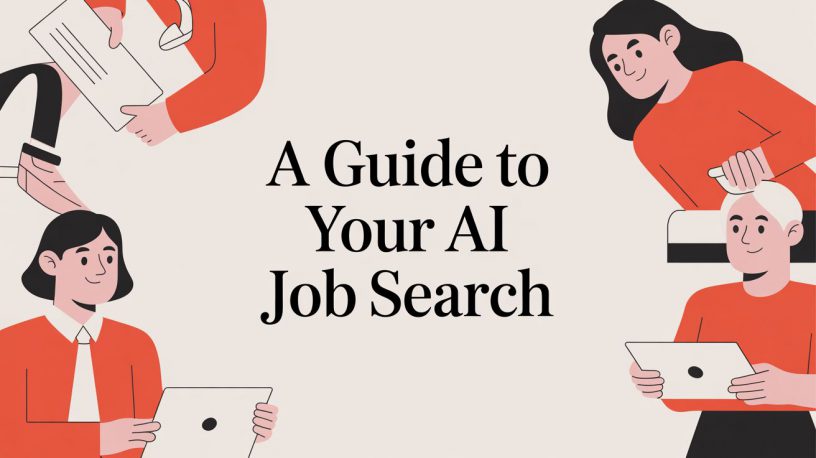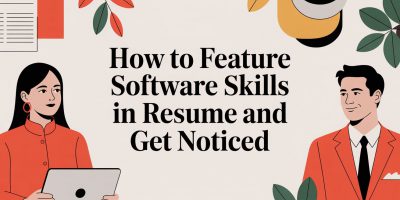An AI job search is a smart way to find and apply for jobs. It helps you work faster and better. You can use AI tools to build a great resume. These tools also find jobs that fit you perfectly. You can even automate parts of your job application. Using AI saves time and helps you get noticed by recruiters.
How AI Is Changing the Job Search
The old way of finding a job is gone. You no longer have to scroll through job listings for hours. AI-powered tools can help you at every step. Today's job search is not about applying to many jobs. It's about making smart moves. AI makes this possible. This is a big change in how we find jobs.
This change is driven by data. Industries that use AI are more productive. This often means higher pay for workers with the right skills. The PwC 2025 AI Jobs Barometer found that wages in AI-heavy industries grow twice as fast. Workers with AI skills are earning more. This shows it's important to learn these new technologies for your career.
The New Job Search Workflow
The AI-powered job search has three main stages. There are tools for each stage.
- Preparation: You start by building a strong foundation. AI can help you create a resume that impresses hiring managers. It also helps your resume pass through automated screening software (ATS).
- Discovery: AI platforms can find the best jobs for you. They search thousands of postings to match your skills and career goals. This means you don't have to hunt for jobs yourself.
- Execution: AI tools can help you prepare for tough interview questions. They can also handle repetitive application tasks. This frees you to focus on making a good impression.
The infographic below shows what this modern process looks like.
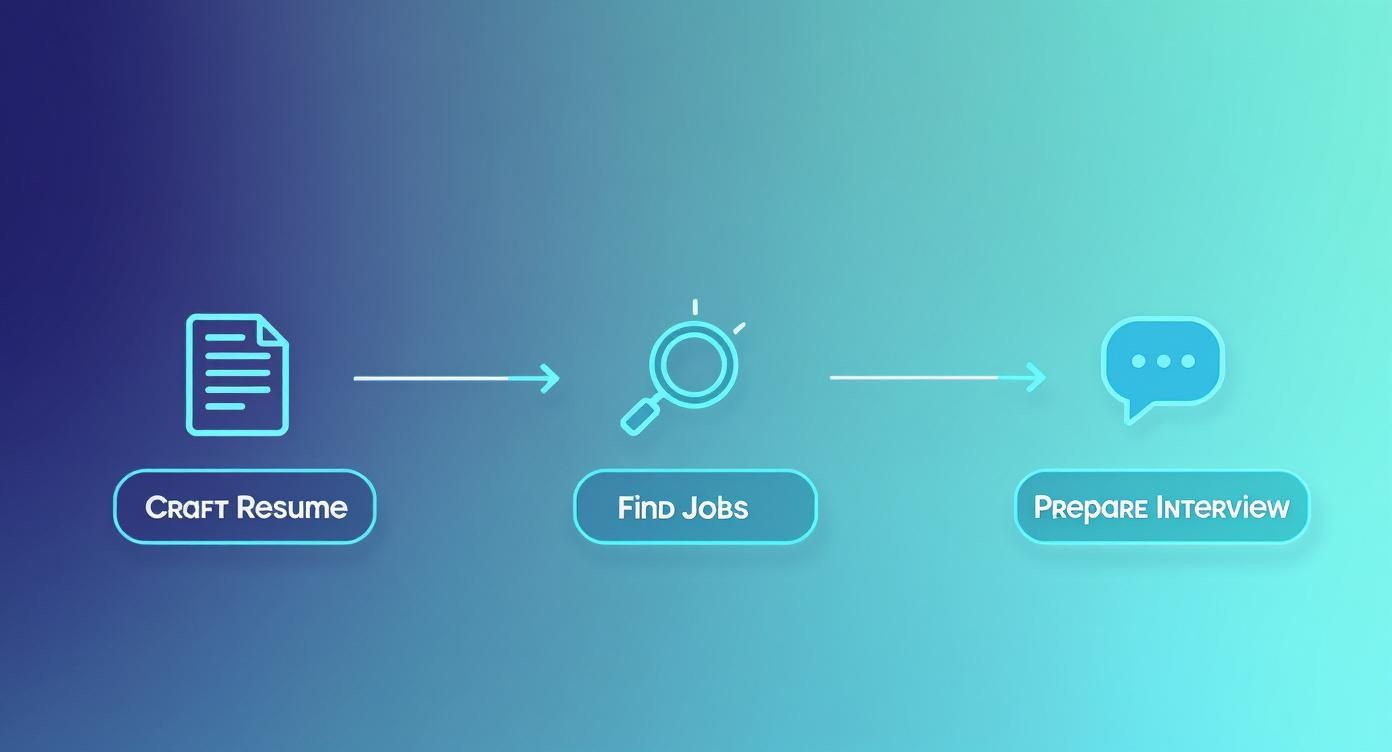
This entire flow shows how different AI tools create a smart system. It changes a hard manual process into a smooth campaign to land your ideal job.
Let's look at which tools are best for each part of the process. It's helpful to know what to use and when.
Key AI Tools for Each Job Search Stage
This table shows which AI tools are effective for different parts of your job search. It helps you choose the right technology.
| Job Search Stage | AI Tool Type | Primary Benefit |
|---|---|---|
| Preparation | AI Resume Builders | Optimizes your resume for ATS and highlights key skills. |
| Discovery | AI Job Matching Platforms | Finds relevant job openings based on your profile and skills. |
| Execution | AI Auto-Apply Tools | Automates filling out repetitive application forms to save time. |
| Interviewing | AI Interview Coaches | Provides feedback on your answers to build confidence. |
| Networking | AI Outreach Assistants | Helps draft personalized messages for recruiters. |
Choosing the right tool for the right task is important. Matching technology to your needs makes every step of your job search more effective.
Crafting Your AI-Powered Resume and Cover Letter
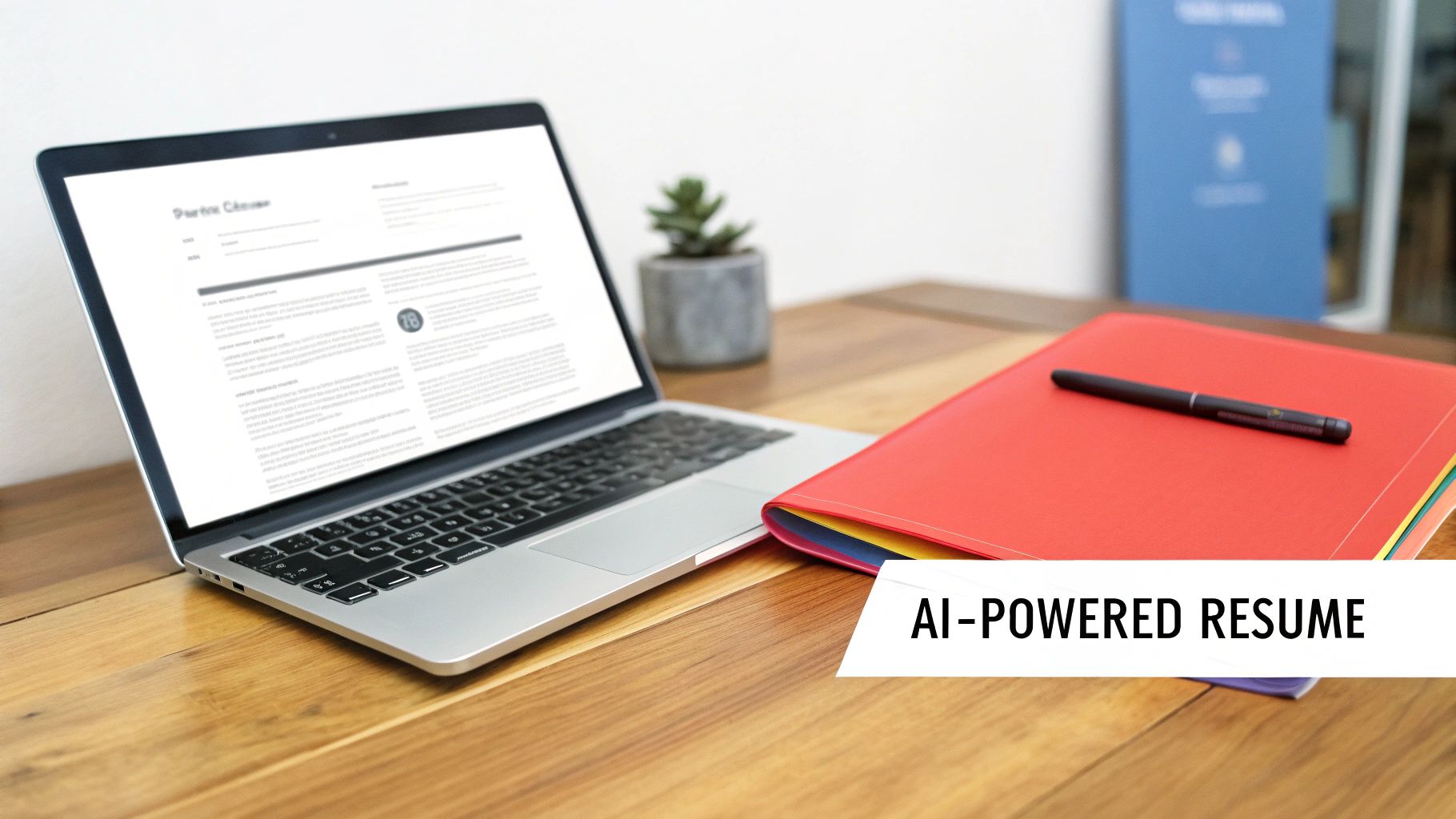
Your resume and cover letter are your first introduction to an employer. They are often your only chance to make a good impression. AI can help you make sure it's a great one. Think of it as a personal editor. It makes your documents sharp, customized, and ready to get past screeners.
Tailoring your application for each job is hard work. It can be exhausting. A smart ai job search strategy can do this repetitive work for you. This frees you to apply to more jobs that are a good fit.
Using AI to Beat the Bots
Most large companies use Applicant Tracking Systems (ATS). These systems scan resumes for keywords from the job description. If your resume is missing these keywords, a hiring manager may never see it.
AI tools are very helpful here. You can paste your resume and a job description into an AI tool. It can then find the keywords you are missing. This greatly improves your chances of getting to the next round.
Here is a prompt you can use with a tool like ChatGPT:
"Analyze this job description for a [Job Title] role: [Paste Job Description Here]. Now, review my resume: [Paste Your Resume Here]. Identify the top 5 keywords and skills I am missing and suggest where I can naturally include them in my experience section."
This simple step makes resume screening a targeted strategy, not a guess.
From Duties to Achievements
A good resume shows what you have accomplished, not just your duties. AI is very good at this. It can turn simple descriptions of your duties into powerful, measurable achievements. This makes recruiters take notice.
Let’s look at an example.
- Before AI: "Managed the company's social media accounts and created content."
- After AI: "Grew social media engagement by 35% in six months by developing and executing a data-driven content strategy across Instagram and LinkedIn."
The second version is specific. It has a measurable result and uses stronger words. It tells a better story. You can use a prompt like this:
"Rewrite this resume bullet point to be more achievement-oriented and include a metric: '[Your Original Bullet Point]'. Suggest a quantifiable result I could add, such as a percentage increase or a time saved."
This process helps you focus on the value you delivered, not just the tasks you did.
Once you have these powerful points, use a platform like GainRep's Resume Builder to create a standout document. The goal is to tell the story of your impact.
Finding Perfectly Matched Jobs with AI
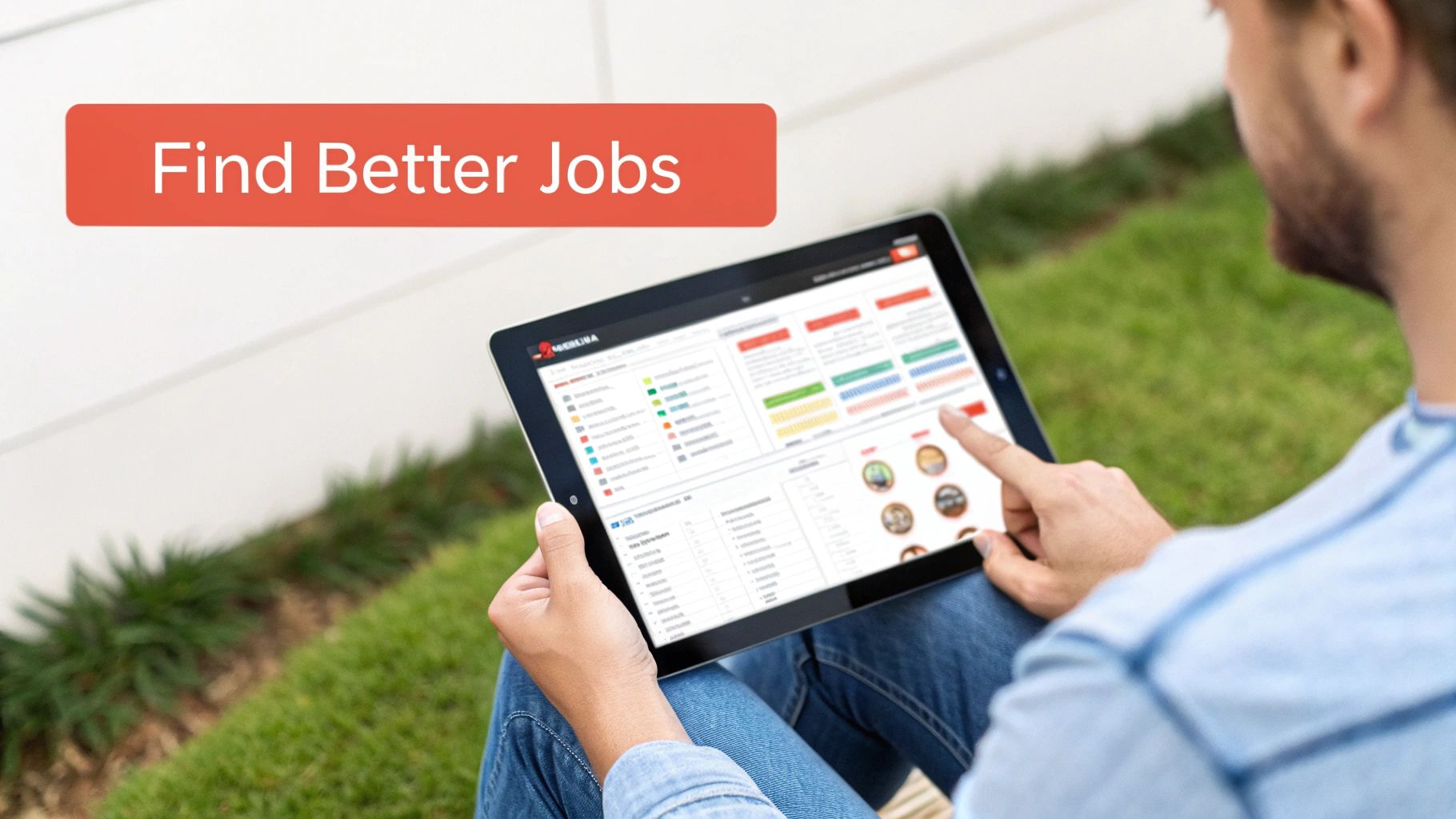
Searching job boards for hours can be frustrating. You find many roles that are not quite right. An AI job search changes this. The right jobs start finding you.
New AI platforms do more than match keywords. They analyze your whole resume. They look at your skills, experience, and career path. This helps them find jobs where you can succeed and grow.
This is very important now. The job market is getting harder, especially for new graduates. In March 2025, the unemployment rate for U.S. college grads was 5.8%. This was the highest in over four years. To learn more about how AI is shaping the job market, see insights from J.P. Morgan Global Research. Using these smart tools is now a necessity.
How AI Job Finders Filter the Noise
Traditional job alerts can fill your inbox with irrelevant jobs. AI tools are much smarter. You can give them very specific criteria. This ensures every notification is a potential match.
These platforms also learn from you. If you dislike a suggested job, the AI learns why. This feedback makes its recommendations better over time. Your search becomes more focused and less frustrating. The system cuts through the clutter.
Think of it as a personal recruiter working for you all the time. It searches the entire web, including small job boards, and gives you a list of great roles.
Getting Instant Feedback on Your Fit
Modern AI job search tools can score your resume against a job description instantly. You can see a compatibility score before you apply.
This gives you a clear idea of how well you match the role. It shows your strengths. It also points out where you might be missing important keywords or skills.
This instant analysis is a game-changer. It helps you decide quickly if a role is worth your time. You can also see if you need to adjust your resume before applying.
This feedback loop makes an AI-powered search very effective. You find jobs and get a clear plan on how to become a top candidate for each one.
Automating Your Applications (Without Looking Like a Robot)
Applying to jobs manually is a numbers game. It takes hours to fill out the same forms over and over. You might miss other great opportunities while you do this. Your AI job search can move from finding roles to actively applying for them.
AI auto-apply tools handle the most boring part of the job hunt. You provide your resume, work history, and preferences. The AI then fills out applications for you on major job boards. This is not about spamming companies. It's about getting your application in front of more relevant employers without burning out. Use a service like GainRep's AI Auto-Apply to streamline this process.
Automation is becoming a necessity. The job market is changing as AI becomes more common. Data from the Federal Reserve Bank of St. Louis shows a link between jobs with high AI exposure and employment changes. For jobs in tech and math, AI exposure is already around 80%. Things are moving fast. You can see the full findings on occupational variation at stlouisfed.org. Automating your search helps you keep up.
Setting Up Your Auto-Apply Profile
An automation tool is only as good as the information you give it. A rushed profile will lead to irrelevant applications. You need to be detailed from the start.
First, upload your best resume. This is the foundation for the AI's work. Next, be very specific with your job preferences. Include keywords, target industries, preferred company sizes, and locations.
Think of it like giving clear instructions to an assistant. Better directions lead to better results. A well-configured profile ensures the AI only applies to roles that match your career goals.
How to Make Sure Your Submissions Are High-Quality
Automation is not a magic button. You still need to manage the process to ensure your applications are high-quality. You should blend AI speed with your own human judgment.
Here are a few tips:
- Use a "Master" Resume: Your uploaded resume should be your best version. It should be full of relevant keywords and achievements.
- Get Granular with Filters: Use all the filters. Set your salary expectations, job type, and add negative keywords to exclude roles you don't want.
- Review Your Applications: Check your dashboard regularly. See where the AI has applied for you. This keeps you informed and ready for calls from recruiters.
The real benefit is not just speed. It is about saving your time and energy. By automating the grunt work, you can focus on networking, preparing for interviews, and making connections.
This approach turns a boring task into a strategic advantage. You apply to more of the right jobs in less time. It is the definition of working smarter.
Preparing for Interviews with AI

Getting an interview invitation is a big step. It is your chance to show a real person why you are the best fit. AI can't shake their hand for you, but it can help you prepare. Using AI for preparation helps you feel confident and ready to impress.
You need to do more than just list points from your resume. You need to tell a good story and ask smart questions. Your AI job search continues even after an interview is scheduled.
Generating Likely Interview Questions
Not knowing what an interviewer will ask can cause anxiety. AI can reduce this uncertainty. It can predict the most likely questions based on your application.
Feed an AI model your resume and the job description. It can create a custom list of questions. This lets you focus your practice on what matters for the specific role.
Here is a prompt you can try:
"Act as a hiring manager for a [Job Title] role. Based on the job description below and my attached resume, generate 10 likely interview questions. Focus on behavioral questions related to the key responsibilities."
This prompt gives you a targeted list to practice with. It makes your prep session much more focused.
Practicing with AI Mock Interviews
Thinking about your answers is different from saying them out loud. AI-powered platforms like Interview Warmup by Google or Interviewer.AI let you practice in a low-pressure way.
These tools give you useful feedback on things like:
- Clarity and Conciseness: Are your answers direct and easy to follow?
- Pacing and Tone: Do you sound confident and engaged?
- Keyword Usage: Are you using language that fits the role?
Practicing with these tools builds muscle memory. Your best answers will come naturally during the real interview.
Conducting Rapid Company Research
Asking smart questions at the end of an interview shows you are interested. It shows you have done your research. AI can help you research much faster. You can ask an AI to summarize key information for you.
Try this prompt:
"Summarize the key strategic challenges and recent successes for [Company Name] based on their latest quarterly earnings report and recent news articles. What are their top three priorities for the next year?"
This gives you the information you need to ask intelligent questions. You will be ready to have a real conversation.
Common Questions About the AI Job Search
Starting an AI job search might feel new. You know the technology is powerful, but you may have questions. Let's answer a few common questions so you can start with confidence.
Is It Okay to Use AI for My Resume?
Yes, it is one of the smartest things you can do. Think of AI as your personal writing coach. It can help you rephrase bullet points, customize your summary, and catch typos.
The final resume must be yours. You are the expert on your career. Review every AI suggestion to make sure it is accurate and sounds like you. The goal is to make your real experience shine. Your resume should be AI-enhanced, not AI-created. A tool like a resume builder can provide a great starting point.
Can AI Auto-Apply Tools Hurt My Job Search?
They can if you use them without thinking. Sending out hundreds of generic applications is a bad idea. Recruiters might flag your resume as spam.
Used smartly, these tools save a lot of time. The key is in the setup. Be very specific with your filters. Choose the exact job titles, industries, company sizes, and locations you want. Pair that with a great resume. You can save hours each week while applying to the right jobs. Platforms like GainRep's AI Auto-Apply help you manage this process.
Remember, automation is not just about applying to more jobs. It's about applying to more of the right jobs. This frees up your time to prepare for interviews.
How Do I Keep My Data Safe with AI Job Tools?
Data privacy is very important. Stick with well-known AI job search platforms. Read their privacy policy before you sign up to see how they handle your information.
Follow a few simple rules:
- Don't overshare: Never give out sensitive information like your social security number until you are in the official hiring process.
- Use strong passwords: Make them unique for every job site.
- Watch for phishing scams: Be careful with emails that seem off. A real company will not ask for financial details by email before a formal offer.
Will AI Replace Human Recruiters?
This is unlikely. AI is changing how recruiters work. AI handles repetitive tasks like screening applications and scheduling calls.
This allows human recruiters to focus on what they do best. They can build relationships and judge cultural fit. They can have conversations that AI cannot. The final hiring decision is almost always made by a person. AI is a powerful assistant that makes the process smoother.
Ready to make your job search smarter, not harder? Gainrep offers a complete suite of tools to help you stand out. From building a powerful resume to automating your applications, you can find your next great opportunity faster. Get started with our AI Auto-Apply service today.
